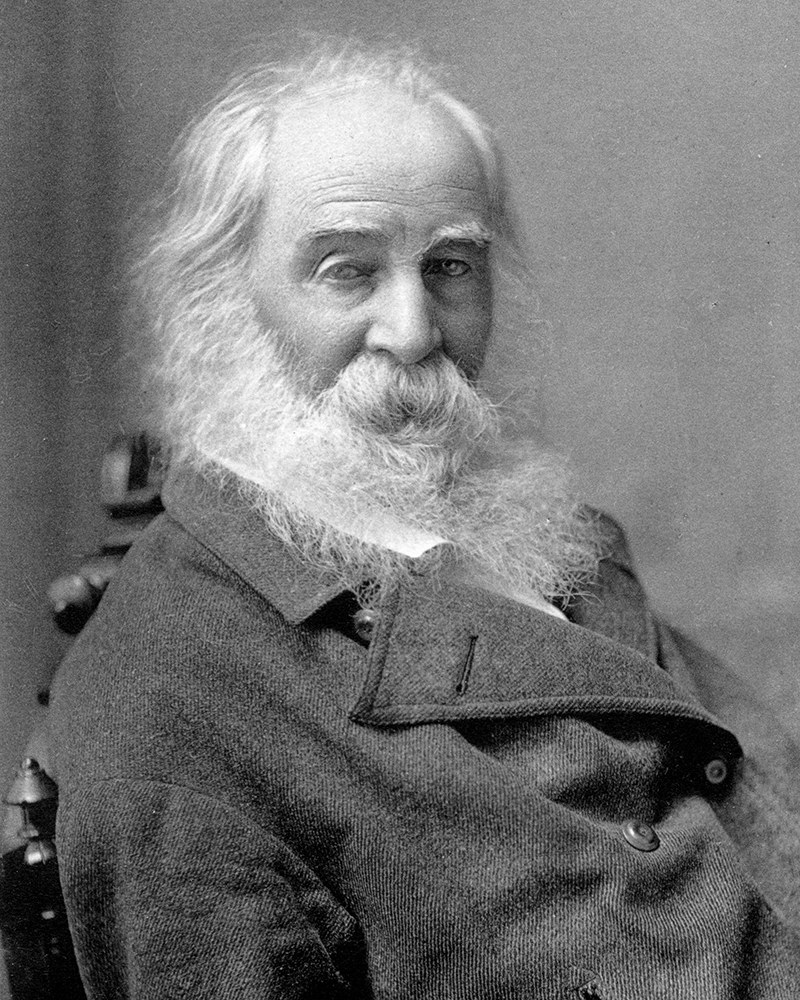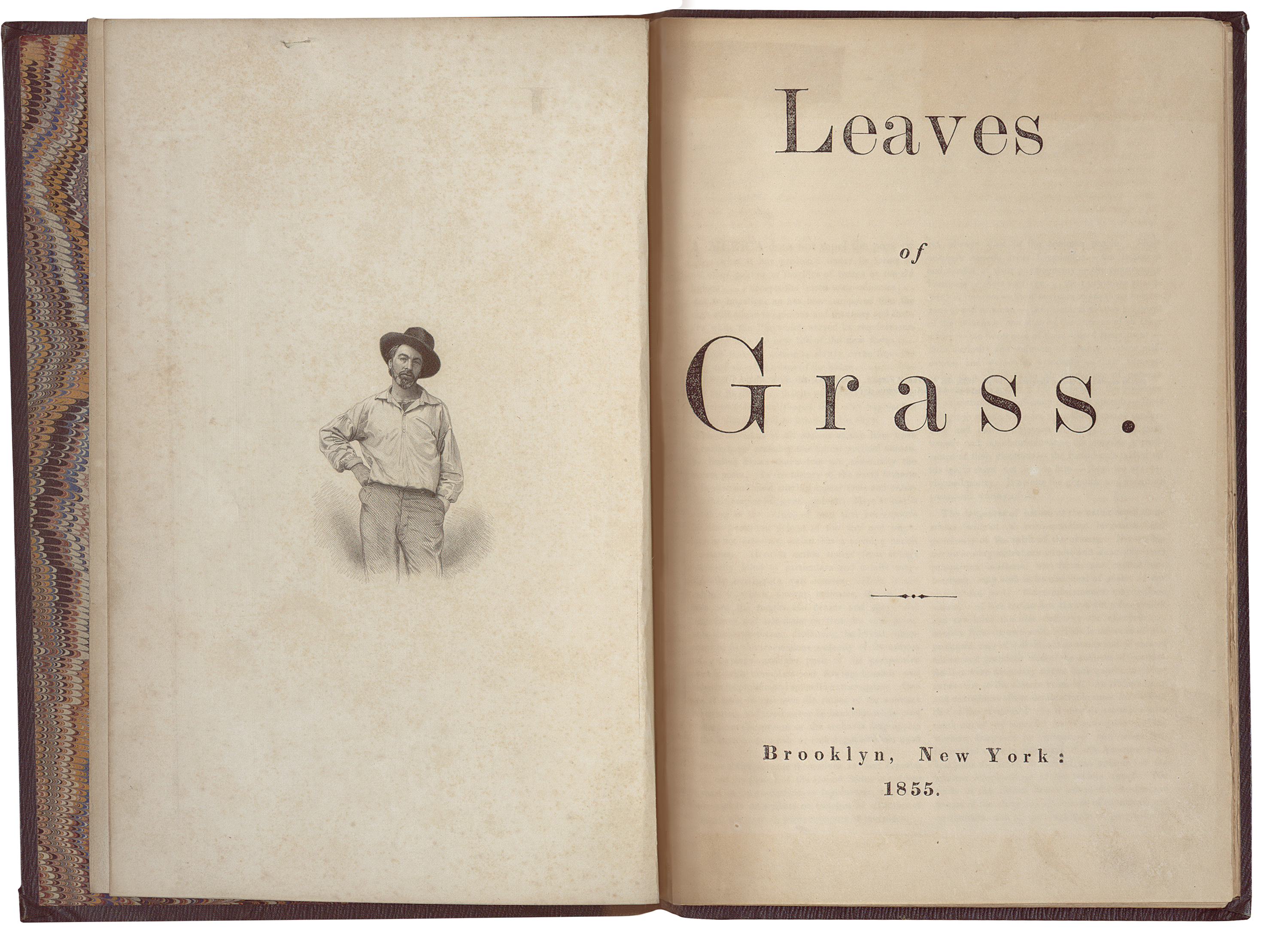Whitman, Walt (1819-1892), was an American poet who wrote Leaves of Grass. This collection of poems is considered one of the world’s major literary works.

Whitman’s poems sing the praises of the United States and of democracy. The poet’s love of America grew from his faith that Americans might reach new worldly and spiritual heights. Whitman wrote: “The chief reason for the being of the United States of America is to bring about the common good will of all mankind, the solidarity of the world.”
Whitman may have begun working on Leaves of Grass as early as 1848. The book’s form and content were so unusual that no commercial publisher would publish it. In 1855, he published the collection of 12 poems at his own expense. In the preface, Whitman wrote: “The United States themselves are essentially the greatest poem.” Between 1856 and 1892, Whitman published eight more revised and enlarged editions of his book. He believed that Leaves of Grass had grown with his own emotional and intellectual development.
His work.
Beginning students of Whitman will find it easiest to study the poems separately. They should try to understand each poem’s imagery, symbolism, literary structure, and unity of theme.

“Song of Myself,” the longest poem in Leaves of Grass, is considered Whitman’s greatest. It is a lyric poem told through the joyful experiences of the narrator, simply called “I.” The narrator chants the poem’s 52 sections. Sometimes “I” is the poet himself—”Walt Whitman, an American.” In other passages, “I” speaks for human beings as a whole, the universe, or a specific character being dramatized. Like all Whitman’s major poems, “Song of Myself” contains symbols. For example, in the poem he describes grass as a symbol of life. He wrote that grass is “the babe of vegetation,” “the handkerchief of the Lord/A scented gift and remembrancer designedly dropt.”
“Out of the Cradle Endlessly Rocking” (1859) tells of a man recalling a boyhood experience in which a mockingbird lost its mate in a storm at sea. The memory of the bird’s song teaches the man the meaning of death. Thus, the true vocation of a poet is to celebrate death as merely part of the cycle of birth, life, death, and rebirth.
Whitman wrote “When Lilacs Last in the Dooryard Bloom’d” (1865) on the death of Abraham Lincoln. Lincoln died in April, a time of rebirth in nature. As his coffin is transported from Washington, D.C., to Springfield, Illinois, it passes the young wheat, “every grain from its shroud in the dark-brown fields uprisen.” Whitman says that each spring the blooming lilac will remind him not only of the death of Lincoln, but also of the eternal return to life. The evening star Venus symbolizes Lincoln, who has “droop’d in the western sky.”
In “Passage to India” (1871), Whitman sees achievements in transportation and communication as symbols of universal brotherhood. Individuals are to be united with themselves and then with God, the “Elder Brother.”
A group of Civil War poems called “Drum Taps” (1865) describes battlefield scenes and Whitman’s emotions during wartime. “O Captain! My Captain!” (1865), another poem on Lincoln’s death, is Whitman’s most popular poem. However, it differs from his others in rhyme and rhythm. The “Children of Adam” poems (1860) defend the sacredness of sex. The “Calamus” poems (1860) praise male companionship.
Whitman wrote in a form similar to thought-rhythm, or parallelism. This form is found in Old Testament poetry. It is also found in sacred books of India, such as the Bhagavad-Gita, which Whitman may have read in translation. The rhythm of his lines suggests the rise and fall of the sea he loved so much. This structure is better suited to expressing emotion than to logical discussion.
In general, Whitman’s poetry is idealistic and romantic, and his prose is realistic. His best prose is in a book of essays, mostly autobiographical, called Specimen Days (1882). Whitman’s essay “Democratic Vistas” (1871) deals with his theory of democracy and with the creation of a democratic literature. The Library of America published Whitman’s collected Poetry and Prose in 1982. In 2016, an American graduate student discovered a previously forgotten short novel by Whitman. The novel, called Life and Adventures of Jack Engle, portrays the adventures of an orphan in New York City. It was originally serialized in the New York City newspaper The Sunday Dispatch in 1852 and published for the first time in book form in 2017.
His life.
Walter Whitman was born on May 31, 1819, in West Hills, Long Island, New York. He grew up in Brooklyn. He worked as a schoolteacher, printer, and journalist in the New York City area. He wrote articles on political questions, civic affairs, and the arts. Whitman loved mixing in crowds. He attended debates, the theater, concerts, lectures, and political meetings. He often rode on stagecoaches and ferries just to talk with people.
During the American Civil War, Whitman was a government clerk. He was also a volunteer assistant in the military hospitals in Washington, D.C. After the war, he worked in several government departments until he suffered a stroke in 1873. He spent the rest of his life in Camden, New Jersey, where he continued to write poems and articles. See Camden.
Whitman believed that the vitality and variety of his life reflected the vitality and variety of American democracy during his time. Most critics accept this view of the man and his poems. However, some insist Whitman was not a prophetic spokesman. Instead, he was simply a powerful and unusual lyric poet. Whitman died on March 26, 1892.
See also Leaves of Grass; Out of the Cradle Endlessly Rocking; Poetry (Forms).
